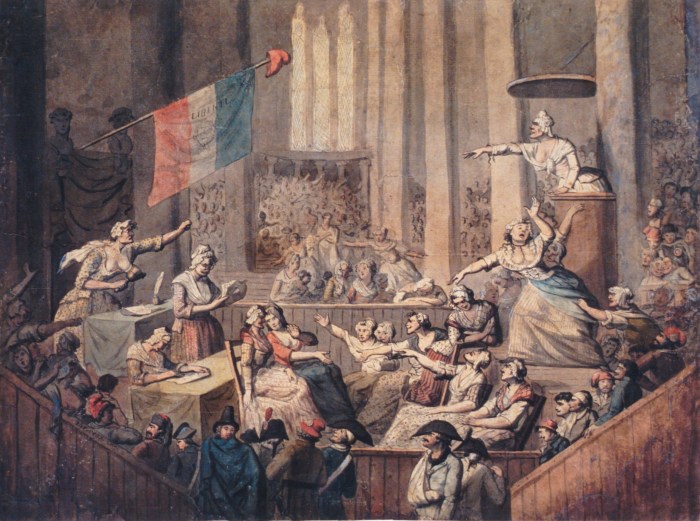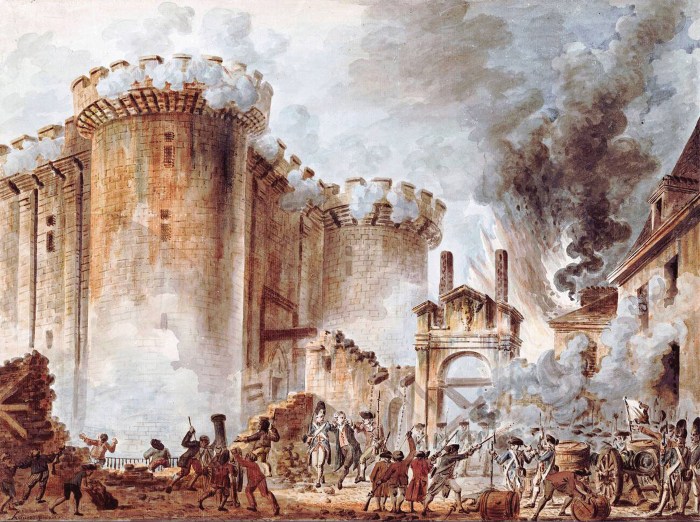The french revolution signaled the – The French Revolution, a pivotal event in world history, signaled the dawn of modern democracy and human rights. Sparked by a complex interplay of political, social, and economic factors, it unleashed a wave of revolutionary fervor that would forever alter the course of human civilization.
The Revolution’s legacy extends far beyond the borders of France, inspiring revolutions and social movements across the globe. Its ideals of liberty, equality, and fraternity continue to resonate today, shaping our understanding of democracy and the inherent rights of all individuals.
Historical Context

The French Revolution, a pivotal event in world history, was the culmination of complex political, social, and economic factors that had been brewing for decades. The absolute monarchy of King Louis XVI faced mounting challenges from a growing middle class, known as the Third Estate, which sought greater representation and influence in government.
Enlightenment ideas, emphasizing reason, individualism, and natural rights, had spread widely, inspiring a desire for change among the French populace.
Influence of Enlightenment Ideas
- Spread of rationalism and scientific thinking
- Emphasis on individual rights and liberty
- Belief in the social contract and popular sovereignty
Causes of the Revolution
The French Revolution was triggered by a combination of economic crisis and social inequality. France was heavily in debt due to lavish spending by the monarchy and its involvement in wars. The gap between the wealthy aristocracy and the impoverished masses widened, leading to resentment and unrest.
The Third Estate, comprising the majority of the population, was excluded from political power and subjected to heavy taxation.
Economic Crisis
- Heavy national debt
- Inefficient tax system
- Crop failures and food shortages
Social Inequality
- Feudal system with rigid class distinctions
- Privileges and exemptions for the aristocracy
- Exclusion of the Third Estate from political power
Role of the Third Estate
The Third Estate, led by influential thinkers and politicians, became the driving force behind the Revolution. They demanded representation in the Estates-General, the traditional advisory body to the king. When their demands were rejected, they formed the National Assembly, challenging the authority of the monarchy.
Impact of the American Revolution
The success of the American Revolution in establishing a democratic republic inspired the French people. It demonstrated the possibility of overthrowing a monarchy and creating a government based on popular sovereignty.
Key Events of the Revolution

The French Revolution unfolded through a series of tumultuous events that reshaped the course of French history.
Storming of the Bastille, The french revolution signaled the
On July 14, 1789, a mob stormed the Bastille prison in Paris, a symbol of royal authority. This event marked the beginning of the Revolution and signaled the end of absolute monarchy.
Reign of Terror
From 1793 to 1794, France experienced a period of intense political violence known as the Reign of Terror. The Committee of Public Safety, led by Maximilien Robespierre, executed thousands of suspected counter-revolutionaries, including King Louis XVI and Marie Antoinette.
Rise and Fall of Napoleon Bonaparte
After the Reign of Terror, Napoleon Bonaparte emerged as a military leader and eventually seized power in a coup d’état. He established the French Empire and expanded its territories through military conquests. However, his ambition led to his downfall, culminating in his defeat at the Battle of Waterloo in 1815.
FAQ Summary: The French Revolution Signaled The
What were the main causes of the French Revolution?
The main causes of the French Revolution include economic inequality, social unrest, political oppression, and the influence of Enlightenment ideas.
What were the key events of the French Revolution?
Key events of the French Revolution include the Storming of the Bastille, the Reign of Terror, and the rise and fall of Napoleon Bonaparte.
What was the impact of the French Revolution on the world?
The French Revolution had a profound impact on the world, spreading revolutionary ideas, inspiring revolutions in other countries, and shaping the development of modern democracy and human rights.